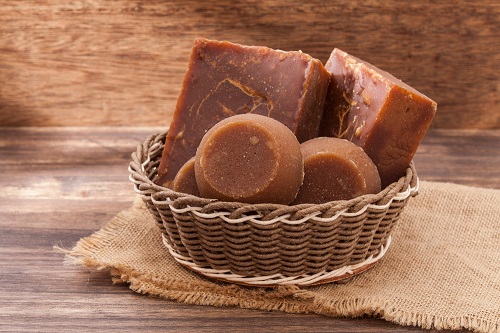Can Dogs Eat Jaggery? Or Is Jaggery Bad For Dogs? Learn about the potential benefits and risks of this sweet treat for your furry friend!
Curious about whether your furry friend can enjoy jaggery? In this article, we’ll explore the potential benefits and risks of this natural sweetener, answering the question, Can dogs eat jaggery? Find out if jaggery is a safe treat for your canine companion!
What is Jaggery?

Jaggery is an unrefined form of sugar made from sugarcane juice or date palm sap, commonly used in South Asian cuisine. It is made by boiling sugarcane juice until it becomes thick and molasses-like, and then it is shaped into blocks or cones for use. Jaggery has a rich, caramel-like flavor and is often used as a natural sweetener in desserts, snacks, and beverages.
Check out Are Black Olives Safe For Dogs? here
Can Dogs Eat Jaggery?
Jaggery is not poisonous to dogs, but they should not eat jaggery.
Despite being less processed than refined sugar, jaggery still contains a high sugar content, which can pose health risks to your canine companions, such as obesity, dental problems, and even diabetes in dogs. Additionally, some dogs may have difficulty digesting jaggery, resulting in gastrointestinal upset, such as vomiting or diarrhea.
It is, therefore, better to refrain from giving jaggery to dogs and instead stick to the dog-friendly treats and diets that vets advise.
Is Jaggery Bad For Dogs?—A Few Health Concerns

There are several health concerns associated with feeding jaggery to dogs. Here are a few:
- High Sugar Content: The high sugar content of jaggery can disrupt the balance of the gut microbiome and cause an overgrowth of harmful bacteria, leading to gastrointestinal upset such as vomiting and diarrhea
- Digestive Problems: Dogs may experience digestive issues such as diarrhea, vomiting, and upset stomach due to the high sugar content in jaggery.
- Obesity: Excessive consumption of jaggery can lead to weight gain and obesity in dogs, leading to problems including joint pain, respiratory issues, and metabolic disorders such as diabetes
- Tooth Decay: The bacteria in the mouth of dogs can use sugar as a substrate and produce acid, which can erode the enamel of the teeth and cause dental problems such as tooth decay and gum disease
- Liver Damage: Jaggery contains a high amount of iron, which can be toxic to dogs if consumed in large amounts. Excessive iron intake can cause liver damage and other health problems, such as vomiting and diarrhea
- Allergic Reactions: Refer to your pet’s health profile and learn about its specific food allergies or sensitivities. Make sure to check the ingredients in the jaggery before giving it to them. Additionally, some types of jaggery may contain additives such as artificial colors or flavors, which can be harmful to dogs.
- Increased Risk of Pancreatitis: Dogs who consume large amounts of jaggery are at an increased risk of developing pancreatitis, which is a painful and potentially life-threatening condition.
Check out Can Dogs Eat Cotton Candy? here
How Can I Avoid Giving Jaggery to My Dog?

- Read Labels Carefully: When buying dog food and treats, make sure to read the labels carefully and avoid products that contain jaggery or other sweeteners.
- Avoid Sharing Table Scraps: Avoid giving your dog table scraps that contain jaggery or other human foods that are not safe for dogs.
- Keep Them Out of Reach: If you have jaggery at home for your own consumption, make sure to keep it out of reach of your dog to prevent accidental ingestion.
- Choose Dog-Friendly Treats: Choose dog-friendly treats and foods recommended by veterinarians that are specifically designed for dogs and are safe and healthy for them to consume.
- Be Mindful of Portion Sizes: When giving treats to your dog, be mindful of portion sizes and avoid overfeeding them, as excessive calorie intake can lead to weight gain and other health issues.
Alternatives of Jaggery For Dogs
If you’re looking for alternative sweeteners or treats for your dog that are safe and healthy, here are some options:
- Peanut Butter: Dogs love peanut butter, and it’s a great source of protein and healthy fats. However, make sure to choose a natural peanut butter that is free of added sugars, salt, and xylitol.
- Fresh Fruits: Fresh fruits such as apples, bananas, blueberries, and strawberries are great sources of vitamins, fiber, and antioxidants for dogs. However, some fruits such as grapes and raisins are toxic to dogs.
- Vegetables: Dogs can also benefit from eating vegetables such as carrots, green beans, and sweet potatoes, which are low in calories and high in nutrients. However, avoid feeding onions, garlic, and other toxic vegetables to dogs.
- Commercial Dog Treats: There are many commercial dog treats available that are specifically designed for dogs and are made with healthy ingredients.
Some Myths And Facts About Dogs And Sweets
- Myth: Dogs can’t eat any kind of sweets.
Fact: While some sweets can be harmful to dogs, there are safe options that can provide them with a healthy source of carbohydrates and natural sugars. - Myth: Dogs shouldn’t eat any sugar.
Fact: Dogs can tolerate small amounts of sugar, but too much can lead to health problems such as obesity, dental issues, and diabetes. - Myth: Sugar-free sweets are safe for dogs.
Fact: Many sugar-free sweets contain artificial sweeteners such as xylitol, which is toxic to dogs and can cause severe health problems or even death. - Myth: Dogs won’t eat sweets on their own.
Fact: Dogs have a sweet tooth and may be attracted to sugary foods. It’s important to keep sweets and other harmful foods out of reach of your dog. - Myth: Giving dogs sweets is a sign of affection.
Fact: While it’s natural to want to treat your dog, giving them too many sweets can lead to health problems. Instead, show your affection with healthy treats, exercise, and quality time together.
Check out Can Dogs Eat Almond Butter | Is Almond Butter Safe for Dogs here
Quick Takeaways
So, Can Dogs Eat Jaggery? The high sugar content makes it unsuitable as a treat for dogs because it can cause a number of health concerns, including weight gain, dental troubles, and digestive problems. If you want to treat your furry buddy occasionally, you should stay away from feeding dogs any items that contain sugar and instead choose healthier substitutes.
It is advised to visit a veterinarian and think about adjusting your dog’s diet if your dog exhibits symptoms of weight gain, dental decay, or other health problems in order to maintain its long-term health and happiness.
